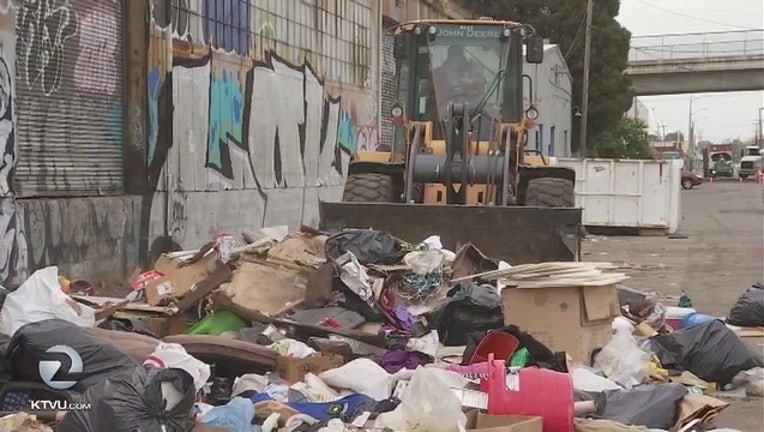San Francisco working to prevent Hepatitis A outbreak with vaccinations, hygiene efforts

An Oakland homeless encampment is cleared in an effort to prevent a hepatitis A outbreak. San Francisco is undergoing their own preventative measures.
SAN FRANCISCO (BCN) With outbreaks of a deadly liver disease reported in San Diego and in Los Angeles and Santa Cruz counties, San Francisco officials are hoping to prevent it from taking hold here with a combination of vaccinations and public hygiene efforts.
San Diego, Los Angeles and Santa Cruz County have all declared outbreaks of hepatitis A in the past month, with San Diego reporting 444 cases this year, including more than a dozen deaths, and Santa Cruz 70.
San Francisco, by comparison, has seen 13 confirmed cases so far this year, none of them fatal, according to health department spokesman Brent Andrew.
Hepatitis A is spread through contact with an infected person's feces. It can be spread from unwashed hands to food or objects and also through sex or shared needles used for injecting drugs.
Homeless residents and injecting drug users are among the more vulnerable populations because they may lack consistent access to clean bathrooms and hand washing facilities.
However hepatitis A can also be transmitted through food and can be brought here from other countries where it is more common by travelers and immigrants. Other vulnerable groups include anyone living with or having sex with an infected person, men who have sex with men, children in day care and people who eat raw or undercooked shellfish.
A vaccine that became available in 1996 is now routinely given to most children and has reduced cases nationwide by about 90 percent.
However Andrew said the city is working to increase the vaccination rates among adults and educate people about the need for hygiene.
"We're doing quite a bit of outreach to the homeless population," Andrew said, noting that this involved both homeless outreach workers and also healthcare workers encouraging people who come in for other matters to
get vaccinated.
Access to bathrooms and clean running water is not always a simple thing for homeless residents, who are often forced to use the outdoors as a toilet.
In an effort to reduce the health risks this causes as well as complaints from neighbors, the Department of Public Works launched a "Pit Stop" program in 2014 providing staffed public restrooms with hand washing
facilities during daylight hours at locations in the Civic Center, Bayview, Haight, Mid-Market, Tenderloin and South of Market neighborhoods.
Using a combination of portable toilets and permanent JC Decaux self-cleaning toilets, the popular program has expanded to 17 locations at a cost of around $200,000 per site, according to Department of Public Works
spokeswoman Rachel Gordon.
The city estimates that the pit stops are now getting around 300,000 uses a year and has found that they reduced steam cleaning requests for surrounding sidewalks, by more than 30 percent in the case of one Tenderloin location.
"We didn't think four years ago that public toilets were going to be such a big issue for us, but it is," Gordon said.
Public Works also has three crews dedicated to steam cleaning areas around homeless encampments and other locations that draw regular complaints about human waste, and prioritizes responses to 311 calls reporting waste, Gordon said.
"We really take it very seriously, for the protection of our workers as well as the public, to try to get the human waste quickly," Gordon said.
Symptoms of hepatitis A including fever, dark urine, anorexia, nausea and abdominal discomfort, and can also lead to jaundice. The incubation period can range from around two weeks to 50 days, according to
health officials.
While some people infected with the disease can show few or no symptoms, others can become seriously ill and the illness can sometimes last for months.
In addition to regular hand washing, city health officials say residents should avoid having sex, or sharing food, drinks, cigarettes or other personal items such as toothbrushes and towels with anyone who has
hepatitis A.
The hepatitis A vaccine can be obtained from any medical provider. Information on locations providing free vaccinations is available by calling 311 or by going to http://www.sfcdcp.org/preventhepA.html. More information on hepatitis A is available at http://www.sfcdcp.org/hepatitisa.html.

